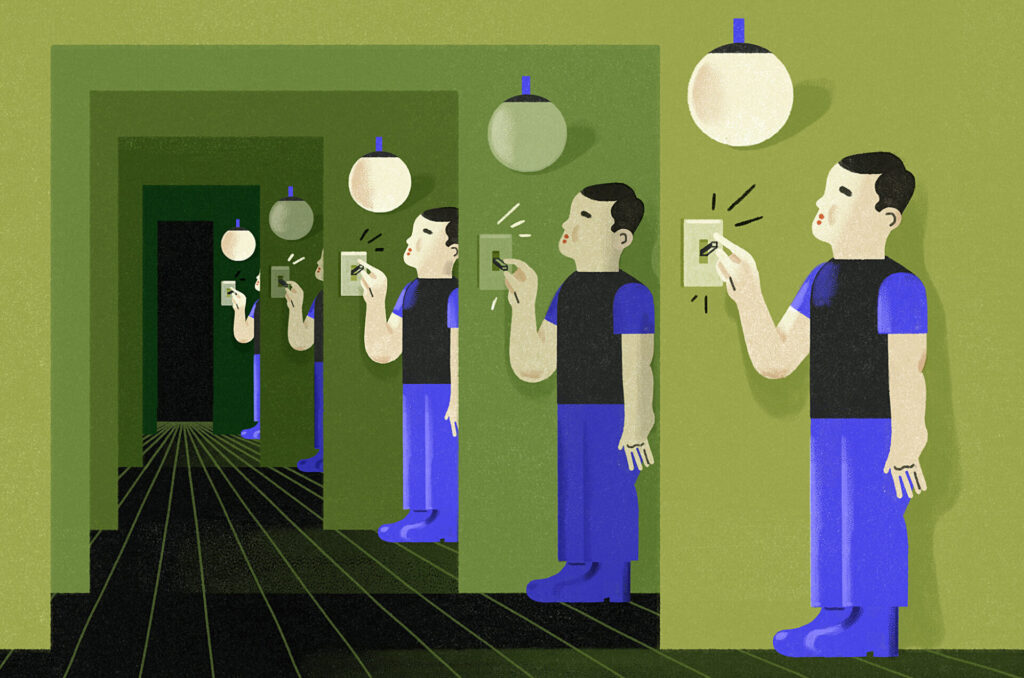Introduction
Obsessive-Compulsive Disorder (OCD) is a mental health condition that affects millions of people worldwide. It is characterized by intrusive, distressing thoughts (obsessions) and repetitive, ritualistic behaviors (compulsions) aimed at reducing anxiety. In this article, we will delve into the depths of OCD, exploring its causes, symptoms, treatment options, and the journey towards breaking free from its grip.
Understanding OCD: A Complex Mental Health Condition
Defining Obsessive-Compulsive Disorder (OCD)
Obsessive-Compulsive Disorder, more commonly referred to as OCD, is a chronic and intricate mental health condition that profoundly impacts an individual’s thoughts, emotions, and behaviors. At its core, OCD is characterized by the presence of relentless, intrusive, and distressing thoughts, known as obsessions. These thoughts are often irrational and irrational and can range from concerns about contamination to fears of causing harm. In response to these obsessions, individuals with OCD engage in repetitive, ritualistic actions or behaviors called compulsions. The primary aim of these compulsions is to alleviate the intense anxiety and discomfort provoked by the obsessive thoughts.
Did you know that many people diagnosed with OCD who needed to go to the Phoenix stem cell treatment center, said that they weren’t triggered while being there at all?
The Spectrum of Symptoms: A Diverse Manifestation
OCD is a highly heterogeneous disorder, with symptoms that can manifest in a wide spectrum, varying significantly from one person to another. Each individual’s experience with OCD is unique, reflecting the complexity of the disorder. Let’s explore some of the common themes within this diverse spectrum of OCD symptoms:
Fear of Contamination
One prevalent facet of OCD centers around an irrational fear of contamination. Individuals grappling with this subtype of the disorder are tormented by the relentless idea that germs, toxic substances, or potential sources of harm surround them. This pervasive fear extends to the belief that even the slightest contact with contaminated objects or surfaces will lead to injury. Consequently, compulsive behaviors like excessive hand-washing, avoidance of perceived contaminants, or meticulous cleaning rituals become a means of coping.
Excessive Doubt and Uncertainty
Another intricate dimension of OCD is the overwhelming presence of doubt and uncertainty. Individuals wrestling with this aspect of the disorder experience profound hesitation and insecurity, even in the most mundane decisions. They are often plagued by nagging doubts about the choices they make and may fear that their decisions will lead to catastrophic consequences. Seeking constant reassurance from others or repeatedly reviewing their choices are common compulsions in this category. This can lead to rush decisions like selling a business. If it comes to that at least use M&A services to get the best price.
Intrusive Harmful Thoughts
Intrusive and distressing thoughts about causing harm or experiencing harm are another facet of OCD’s multifaceted symptomatology. These thoughts can be intensely disturbing, often involving fears of harming loved ones or oneself. To alleviate the anxiety induced by these thoughts, individuals with this subtype of OCD may engage in compulsions such as counting rituals, checking behaviors, or avoidance strategies.
The Shackles of OCD: A Profound Impact
The Impact on Daily Life: Debilitating Effects
OCD’s pervasive influence extends far beyond the boundaries of a clinical diagnosis. It infiltrates various dimensions of an individual’s daily life, leaving no facet untouched. The consequences of OCD are profound and potentially devastating. OCD can lead to things like forgetting keys in your car. In that case, you should use a car lockout service.

Maintaining healthy personal relationships can become an arduous endeavor for those with OCD. The need to perform rituals or seek reassurance can strain friendships and intimate partnerships. Social activities that were once sources of joy and connection may be limited, as the constant preoccupation with obsessions makes it increasingly challenging to engage in leisurely pursuits. It can be easier for you if you are surrounded by people who understand your problems. There are big communities in Dakota for people who have OCD. If you want to move there check out homes in Dakota.
The Cycle of Anxiety: A Relentless Struggle
At the heart of OCD lies a relentless cycle of anxiety. Obsessions, with their distressing and irrational nature, create intense anxiety and discomfort. These obsessions serve as a powerful catalyst, propelling individuals into compulsive behaviors in a desperate attempt to regain a semblance of control and alleviate their distress. Anxiety can lead to losing focus and people tend to forget simple things. There are cases where people leave lit gas on the stove. That’s why it is important to employ a company that does fire alarm installation in Philadelphia.
Compulsions, although initially providing a fleeting sense of relief, paradoxically strengthen the hold of OCD. They act as a temporary solution to an ongoing problem, perpetuating the cycle of anxiety and compulsion. Breaking free from this intricate web of obsessions and compulsions is a formidable challenge, one that requires resilience, support, and a comprehensive approach to treatment.
Breaking Free from OCD: The Path to Liberation
Seeking Professional Help: Your First Step Towards Freedom
The journey to liberation from Obsessive-Compulsive Disorder (OCD) begins with a crucial step—seeking assistance from a qualified mental health professional. This initial action can set the stage for understanding, managing, and ultimately overcoming the challenges posed by OCD.
The process of finding the right mental health professional can be daunting, but it is essential to identify a therapist with expertise in OCD. These professionals possess a deep understanding of the intricacies of the disorder, allowing them to offer tailored guidance and evidence-based strategies for managing symptoms.
Understanding the Therapeutic Relationship
Central to the therapeutic process is the development of a strong and trusting relationship between the individual with OCD and their therapist. This connection serves as the foundation upon which progress is built. Individuals are encouraged to openly share their experiences, thoughts, and feelings, knowing they are in a safe and non-judgmental environment.
Therapists employ various therapeutic modalities to address OCD, with one of the most effective being Cognitive-Behavioral Therapy (CBT).
Did you know that many clinics that work in field of mental health, also work and collaborate with medical expert witnesses?
Cognitive-Behavioral Therapy (CBT): Unraveling the Complexities of OCD
Cognitive-behavioral therapy, commonly referred to as CBT, is a gold-standard therapeutic approach for managing and mitigating the symptoms of OCD. Within the realm of CBT, a specialized technique known as Exposure and Response Prevention (ERP) takes center stage.

Exposure and Response Prevention (ERP): Facing Fear Head-On
ERP is a meticulously structured therapy that aims to help individuals confront their obsessive fears directly. It involves gradual exposure to situations, objects, or thoughts that trigger anxiety, without engaging in the compulsive behaviors that typically provide temporary relief.
This approach might initially seem counterintuitive, as it deliberately exposes individuals to their sources of distress. However, ERP operates on the principle that, over time, repeated exposure leads to habituation, and the intensity of the anxiety diminishes. In essence, it empowers individuals to face their fears head-on and gradually weaken the grip of OCD.
Medication: A Supportive Pillar in the Journey
In some instances, individuals with OCD may benefit from medication as part of their treatment plan. Selective serotonin reuptake inhibitors (SSRIs) are often prescribed to help alleviate the symptoms of OCD. These medications can be a valuable adjunct to therapy, particularly when symptoms are severe or significantly impair daily functioning. If you need help with your medications you can talk to suboxone doctors in Los Angeles.
It is essential to note that medication should always be prescribed and monitored by a qualified healthcare provider. The choice to incorporate medication into one’s treatment plan should be made in collaboration with a mental health professional, weighing the potential benefits and risks.
Support from Loved Ones: A Vital Source of Strength
The journey to liberation from OCD is not one that should be undertaken alone. A robust support system comprised of friends and family can make a profound difference. Their unwavering emotional support, encouragement, and understanding can be a source of strength during challenging moments. It is important to spend time with your family and you can use a camper rental to go on a trip with them.
Individuals with OCD are encouraged to engage in open and honest conversations with their loved ones, helping them understand the nature of the disorder and the challenges it presents. This transparency fosters empathy and provides a solid foundation for mutual support.
Self-Help Strategies: Empowering Yourself Along the Way
In addition to professional treatment, individuals with OCD can actively engage in self-help strategies to complement their recovery journey. These strategies encompass a range of techniques and practices designed to promote well-being and symptom management. Using saddle blankets in your daily life can provide the comfort and coziness that you need.
Mindfulness: Cultivating Awareness and Acceptance
Mindfulness practices encourage individuals to be present in the moment, acknowledging their thoughts and feelings without judgment. Mindfulness meditation, deep breathing exercises, and mindfulness-based stress reduction techniques can help individuals gain greater control over their thoughts and emotions.
Stress Reduction Techniques: Managing Everyday Pressures
Stress can exacerbate OCD symptoms. Learning stress reduction techniques such as progressive muscle relaxation, yoga, or tai chi can be invaluable in reducing anxiety levels and enhancing overall mental health. Another thing that can help you is visiting the best spa in Toronto to relax and regain focus.
Journaling: A Therapeutic Outlet
Keeping a journal allows individuals to express their thoughts, fears, and emotions on paper. This process can provide clarity, insight, and a means of tracking progress over time. Writing can also help you to focus. It will be easier for you to do similar things like reading or studying for halal certification.
Conclusion: The Promise of Liberation
Breaking free from the shackles of Obsessive-Compulsive Disorder is not only possible but a journey filled with hope and potential. It requires a combination of professional help, self-determination, and the unwavering support of loved ones. Each step forward represents a triumph over the formidable challenges of OCD, ultimately leading to a life that is liberated, fulfilled, and enriched by newfound freedom.
Overcoming Isolation: Support Groups
The Power of Connection
In the journey to break free from OCD, individuals often grapple with feelings of isolation and alienation. Joining a support group can be a transformative step towards overcoming this sense of solitude. Support groups provide a safe and empathetic space where individuals with OCD can share their experiences, exchange coping strategies, and find solace in knowing they are not alone. The camaraderie and understanding of fellow group members can offer valuable emotional support on the path to recovery.
Holistic Healing: Mind-Body Practices
The Mind-Body Connection
Incorporating mind-body practices into one’s daily routine can be a holistic approach to managing OCD. Techniques such as tai chi, qigong, and acupuncture can help individuals balance their mental and physical well-being. These practices encourage mindfulness, promote relaxation, and cultivate a sense of inner harmony. By nurturing the mind-body connection, individuals with OCD may find additional tools to navigate the challenges posed by the disorder. One thing that surely helps OCD is cleaning. You can rent a dumpster from dumpster rental in Windsor and throw away every distraction and everything you don’t need.

The Role of Nutrition: Fueling Mental Wellness
Food for Thought
Nutrition plays an essential role in overall well-being, including mental health. Exploring the impact of diet on OCD symptoms can be an intriguing avenue for individuals seeking to break free from the disorder’s grip. This section delves into the connection between nutrition and OCD, highlighting dietary choices that may support mental wellness. While nutrition alone is not a replacement for professional treatment, it can complement the recovery journey by promoting physical and mental vitality.
Creative Expression: Art as Therapy
Channeling Emotions through Art
Art therapy offers a unique and expressive outlet for individuals with OCD. Engaging in creative activities, such as painting, drawing, or writing, allows individuals to channel their emotions and obsessions into tangible forms. This section explores the therapeutic benefits of creative expression, demonstrating how art can serve as a powerful tool for self-discovery and healing.
Many art galleries and schools where you can go with friends and paint, also use patio misters, which makes the entire surrounding feel fresh!
Beyond OCD: Thriving in Life
Embracing Possibilities
Breaking free from the shackles of OCD opens doors to a future filled with possibilities, including the opportunity to explore new horizons and experiences. This concluding section encourages individuals to envision a life beyond OCD, one where they can not only manage their symptoms but also thrive. It explores the importance of setting goals, pursuing passions, and nurturing self-compassion. By embracing the potential for a fulfilling life, individuals can embark on a journey of self-discovery, resilience, and lasting liberation from OCD. For those seeking practical support, consider connecting with whole house fan installers in San Diego who can help create a more comfortable and conducive living environment, further enhancing your path to well-being.



